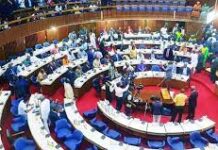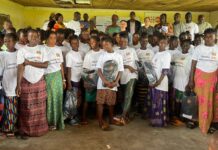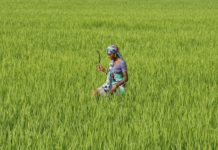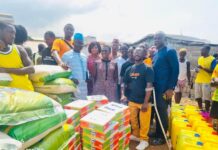By: Mustapha Dumbuya
The confederation of Ex-Pupils association of all secondary schools has been launched on Thursday 19th May 2022 at the Freetown City Hall, Wallace Johnson Street.
Amara Sowa the national coordinator for the free quality education program from the Ministry of basic and senior secondary school (MBSS) expressed his gratitude and appreciation to all the members that had put this idea together for the benefits of the children in Sierra Leone.
He continued that the ministry want to use this platform to help improve the quality of education in all the schools as well restoring integrity.
He continued that the ministry of education had extended the school feeding program as far as Guinea and between now to July the ministry will extend the school feeding program to all the sixteen districts in Sierra Leone.
He said even though they are facing huge challenges in the area of quality and as a government they have been doing all what they can by providing resources and supplying school materials.
He called on CEPASS to help them restore dignity because we in Sierra Leone education have adopted UN ethical practices.
He concluded that the government must stamp out examination malpractice, corruption, exhortation and so on for Sierra Leone to restore it name again as the Athens of West Africa.
Mrs Emerica king president of the Confederation of Ex-Pupils Association for secondary schools explained that they were three in numbers that created this initiative sometimes back in 2021.
The president continued that they had their first meeting on the 7th May, 2021 at the Collegiate School with the Wakuba Boys who hosted them and it was the time they set up an interim committee to run the affairs of the association.
She maintained that on the same day they set up three committees with support from the interim committee which are the constitution committee, welfare committee and the school engagement committee.
Mrs Emerica said all those groups had always been there to work hard and get their constitution and become formally registered under the said names which make them to freely do their work.
She said today we will be launching our logo, motto and the constitution adding that some of their aims are to contribute towards the improvement of the academic excellence of the members of aluminium schools and their programs.
She said another aim is to raise financial and material resources for effective and efficient teaching and learning for members of the alumni and to develop and help maintain active alumni, group interaction to lobby and network to government and achieve their goals.
She ended that after the face they will start to open branches in to the provinces and with all this they will fight hard to make sure that they achieve all there aims and objectives.
Mr Sylvester John Meheux president of the Association of retired principles advise the confirmation to work with all the heads of school to prepare the Scheme or record of work weekly adding that the Sierra Leone government is very luck and hoping that the government gives the necessary support.
He continued that they had confidence over the people that form the association and he is very sure through this initiative Sierra Leone will regain it name again as the Athens of West Africa.
He noted that over the years he had noticed several malpractices around some school but by this initiative hoping that all such of games has to be stopped.
He advised members of the association to keep working and liberate the educational systems in Sierra Leone.
massive livestock vaccination campaign…
FAO provides 800,000 doses of PPR vaccines to Government
The Food and Agriculture Organization of the United Nations (FAO) provided 800 000 doses of peptides petits ruminants (PPR) vaccines to the Government of Sierra Leone and launched a nationwide vaccination campaign of sheep and goats against this endemic animal disease.
PPR is a highly contagious animal disease affecting domestic and wild small ruminants, caused by a virus that can infect up to 90 percent of an animal herds, and kills up to 70 percent of the infected animals. The PPR virus does not infect humans, but puts families at risk of losing their livelihoods, food security, and employment opportunities. In addition, PPR considerably affects export earnings and creates supply shortages.
Sierra Leone continues to experience rampant outbreaks of PPR, which is now endemic in the country and affects almost all districts.
In this regard, and to contribute for its global eradication by 2030, the FAO Global PPR Secretariat with funding from the “Peste des Petits Ruminants Global Eradication Programme”, funded by the French Government, donated 800 000 doses of PPR vaccines to support mass vaccination of sheep and goats against this fatal animal disease in the country.
In addition FAO Sierra Leone is implementing a Technical Cooperation Programme TCP/SIL/3806 on “Support to Sierra Leone for Review of Cattle Settlement Policy, Protection of Livelihood Assets through Livestock Vaccination and improving Food Security during COVID-19 Pandemic’’. Part of the funding under this TCP will be used to support the country to conduct mass vaccination against PPR and to conduct pre-vaccination sero-monitoring in all the 16 districts.
During the handover ceremony, Mr. Harding Wuyango, Assistant FAO Representative for Programmes and Officer in Charge, noted that Sierra Leone continues to experience widespread outbreaks PPR, Newcastle disease and rabies. He added that FAO providing vaccines and support to conduct mass vaccination campaigns as well as strengthening the capacity of animal health sector to prevent detect and respond to peste des petits ruminants’ outbreaks.”
The Deputy Minister for Agriculture, Dr. Theresa Tenneh Dick, while receiving the vaccines, said that PPR vaccines from FAO were a very timely move. “On behalf of the Ministry of Agriculture, I extend my sincere appreciation to FAO for this donation of 800 000 doses of PPR vaccines. She noted.
The representative of the University of Makeni (UNIMAK), Dr. Saidu Kanu, registered gratitude for the donation and the launch of the mass vaccination campaign. “PPR is a problem in the country, affecting the livelihood of farmers and rural people who mainly depend on livestock as their safety net; I have no doubt, with the support from FAO, the fight against PPR will succeed.” Dr. Kanu appealed to FAO to extend their support to the country to procure vaccines against Newcastle disease which is another major disease in the country devastating the poultry sector and impacting on livelihoods of the rural farmers.
The Fula Chief of Bombali District thanked FAO and the Government of Sierra Leone for providing the vaccines. The Chief noted that farmers in Bombali have lost over 100 cows and 70 sheep due to infection, and similar cases were reported around Kenema, the Eastern province of the country
Previous Efforts by FAO in prevention and control of PPR in Sierra Leone
In 2021, Sierra Leone benefited from a similar donation of one million doses of PPR vaccines from FAO Global PPR Secretariat. In addition, FAO supported the country the review and validation of the National Strategy for the Control and eradication of Peste des Petits Ruminants and other priority small ruminant diseases in 2019. The review was aimed at aligning the National PPR strategy to the Global PPR strategy which aims to control and eradicate PPR and other major small ruminants’ diseases by the year 2030.
With funding support from the FAO Global PPR Secretariat, the Peste des Petits Ruminants Global Eradication Programme (PPR-GEP) highlights the technical and policy tools foreseen as appropriate to lay the foundation for and commencement of PPR eradication by reducing the prevalence of PPR in currently infected countries. The programme also develops capacity of national Veterinary Services, which are the key players in the successful implementation of the PPR GEP.
Contributing to eradicate PPR in Sierra Leone will increase sustainability, alleviate poverty, improve the resilience of poor pastoralists and their communities, enable them to better cope with other shocks and threats, prevent forced migration and mitigate extremist trends.






































